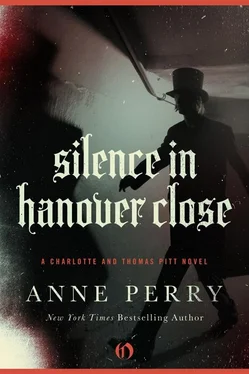Anne Perry - Silence in Hanover Close
Здесь есть возможность читать онлайн «Anne Perry - Silence in Hanover Close» весь текст электронной книги совершенно бесплатно (целиком полную версию без сокращений). В некоторых случаях можно слушать аудио, скачать через торрент в формате fb2 и присутствует краткое содержание. Жанр: Исторический детектив, на английском языке. Описание произведения, (предисловие) а так же отзывы посетителей доступны на портале библиотеки ЛибКат.
- Название:Silence in Hanover Close
- Автор:
- Жанр:
- Год:неизвестен
- ISBN:нет данных
- Рейтинг книги:3 / 5. Голосов: 1
-
Избранное:Добавить в избранное
- Отзывы:
-
Ваша оценка:
- 60
- 1
- 2
- 3
- 4
- 5
Silence in Hanover Close: краткое содержание, описание и аннотация
Предлагаем к чтению аннотацию, описание, краткое содержание или предисловие (зависит от того, что написал сам автор книги «Silence in Hanover Close»). Если вы не нашли необходимую информацию о книге — напишите в комментариях, мы постараемся отыскать её.
Silence in Hanover Close — читать онлайн бесплатно полную книгу (весь текст) целиком
Ниже представлен текст книги, разбитый по страницам. Система сохранения места последней прочитанной страницы, позволяет с удобством читать онлайн бесплатно книгу «Silence in Hanover Close», без необходимости каждый раз заново искать на чём Вы остановились. Поставьте закладку, и сможете в любой момент перейти на страницу, на которой закончили чтение.
Интервал:
Закладка:
“If I ’ear anyfink I’ll tell yer,” Pinhorn added. “Y’owe me, Mr. Pitt.”
“I do, Mr. Pinhorn,” Pitt said dryly. “But not much.” And he turned round to make his way back to the great wooden door and the dripping alley outside.
Pitt knew many other dealers in stolen goods; there were the dollyshops, those poorest of pawnbrokers, who lent a few pence to people desperate enough to part with even their pots and pans or the tools of their trade in order to buy food. He hated such places, and the pity he felt was like being kicked in the stomach. Because he was helpless, he turned to anger as being better than weeping. He wanted to shout at the rich, at Parliament, at anyone who was comfortable, or who was ignorant of these tens of thousands who clung to life by such a frail and dangerous thread, who had not been bred to afford morality except of the crudest sort.
This time he was free to avoid them, along with the thieves’ kitchens, where kidsmen kept schools of children trained to steal and return the profits to them. Similarly he did not need to scour the slop trade: those who dealt in old clothes, rags, and discarded shoes, taking them apart and making up new articles for the poor, who could afford no better. Often even the worst rags were laboriously unraveled and the fiber rewoven into shoddy-anything to cover those who might otherwise be naked.
The articles from the York house had been taken by a thief not only of taste but also of some literacy, and would have been fenced similarly. They were luxuries that could not be converted into anything useful to the patrons of dollyshops.
He made his way back through the tangle of passageways uphill away from the river towards Mayfair and Hanover Close. Thieves usually worked their own areas. Since he could not trace the goods, the best place to start was with those who knew the patch. If it was one of them, word of the theft would probably have reached the old hands. If it had been an outsider, that too would be known by someone. The police had investigated at the time, it had been no secret. The underworld would have its own information.
It took him half an hour after reaching Mayfair to track down the man he wanted, a skinny, lop-legged little man of indeterminate age called William Winsell and known, contrarily, as the Stoat. He found him in the darkest corner of a tavern of particularly ill repute, staring sourly at half a pint of ale in a dirty mug.
Pitt slid into the vacant seat beside him. The Stoat glared at him with outrage.
“Wot you doin’ ’ere, bleedin’ crusher! ’Oo d’ya fink’ll trust me if vey see me wiv ve likes o’ you?” He looked at Pitt’s fearful clothes. “D’yer fink we don’t granny yer, just ’cos yer aht o’ twig in them togs? Still look like a crusher, wiv yer clean ’ands wot never worked, and crabshells”-he did not even bother to glance at Pitt’s feet-“like ruddy barges! Ruin me, you will!”
“I’m not staying,” Pitt said quietly. “I’m going to the Dog and Duck, a mile away, to have lunch. I thought you might like to join me in, say, half an hour? I’m going to have steak and kidney pudding, hot; Mrs. Billows does that a treat. And spotted dick, made with suet and lots of raisins, and cream. And maybe a couple of glasses of cider, brought up from the West Country.”
The Stoat swallowed hard. “Yer a cruel man, Mr. Pitt. You must want some poor bastard cropped!” He made a sharp gesture with his hand at the side of his throat, like a noose under the ear.
“Perhaps, in the end,” Pitt agreed. “Right now it’s only burglary information. Dog and Duck, half an hour. Be there, Stoat, or I shall have to come and see you somewhere less agreeable-and less private.” He stood up, and without looking backwards, head down, he pushed his way through the drinkers and out into the street.
Thirty-five minutes later he was in the more salubrious parlor of the Dog and Duck, with a mug of cider, bright and clear as an Indian summer, in front of him, when the Stoat crept in nervously, ran his fingers round his grimy collar as if easing it from his neck, and wriggled onto the seat opposite him. He glanced round once or twice, but saw only dull, respectable minor traders and clerks; no one he knew.
“Steak and kidney pudding?” Pitt offered unnecessarily.
“Wotcher want orf of me first?” the Stoat said suspiciously, but his nostrils were wide, sucking in the delicious aroma of fresh, sweet food. It was almost as if the steam itself fed him. “ ’Oo’re yer after?”
“Someone who robbed a house in Hanover Close three years ago,” Pitt replied, nodding over the Stoat’s head to the landlord.
The Stoat swiveled round furiously, his face suddenly creasing with outrage. “ ’Oo’re yer signin’ at?” he snarled. “ ’Oozat?”
“The landlord.” Pitt raised his eyebrows. “Don’t you want to eat?”
The Stoat subsided, vaguely pink under the gray of his skin.
“A robbery three years ago in Hanover Close,” Pitt repeated.
The Stoat sneered. “Free years ago? Bit slow, incher? Runnin’ be’ind vese days, are we? Wot was took?”
Pitt described the articles in some detail.
The Stoat’s lip curled. “ Yer in’t after vem fings! Ye’re after ’oo croaked ve geezer wot caught ’em at it!”
“I’d be interested,” Pitt conceded. “But primarily I’m concerned to prove someone innocent.”
“Vat’s a turnup!” the Stoat said cynically. “Friend o’ yours?”
“Hungry?” Pitt smiled. The landlord appeared with two steaming dishes piled high with meat, gravy, and feather-light suet crust. A few green vegetables decorated the side, and a maid stood by with an earthenware jug of cider sweet as ripe apples.
The Stoat’s eyes glazed a little.
“Murder’s not good for business,” Pitt said very quietiy. “Gives robbery a bad name.”
“Bring on the scran!” the little man snapped, then licked his lips and smiled. “Yer right-it’s clumsy and it in’t necessary.” He watched with rapture as his plate was set in front of him, inhaling the delicate steam and sucking his teeth as the cider was poured, eyeing it right to the brim of the tankard.
“What do you know about it, Stoat?” Pitt asked before he took the first mournful.
The Stoat’s eyes opened very wide. They were a clear gray; the redeeming feature of a cramped face, they must once have been handsome. He filled his mouth with food and chewed slowly, rolling it round his tongue.
“Nuffin’,” he said at last. “And that in’t nuffin’, if yer sees wot I mean. Usual yer ’ears a word, if not straight orf, men in a munf er two. Or if ’e’s in lavender ’cos it turned a bit nasty, men a year, mebbe. But vis ’un clean mizzled!”
“If he was in lavender in some nethersken, you’d know?” Pitt pressed. “In lavender” meant in a hiding place from the police, but the Stoat was indicating that this particular thief had vanished.
The Stoat filled his mouth again and spoke round the food with difficulty. “ ’Course I’d know!” he said contemptuously. “Know every slapbang, lurk, nethersken, flash ’ouse, and paddyken fer miles.”
Pitt understood him. He was referring to cheap eating houses, hiding places, low lodging houses, criminal pubs, and taprooms.
“An’ I tell yer vis,” the Stoat went on, sipping his cider appreciatively. “ ’E weren’t no professional. From wot I ’ear ’e got no crow, no snakesman, and ’oo but a fool’d go in the front like ’e did in a place like ’anover Close? Yer gotta know the crushers’d be rahnd every bleedin’ twenty minutes!”
A snakesman was a thin or underdeveloped child who could creep through the bars of a window and, once inside, open the doors for the real thief. A crow was a lookout, frequently a woman, to warn of police or strangers approaching. Pitt already knew the thief was no professional from P.C. Lowther, but it was interesting that the Stoat knew this also. “So he was an amateur,” he said. “Has he done anything else, anything since?”
Читать дальшеИнтервал:
Закладка:
Похожие книги на «Silence in Hanover Close»
Представляем Вашему вниманию похожие книги на «Silence in Hanover Close» списком для выбора. Мы отобрали схожую по названию и смыслу литературу в надежде предоставить читателям больше вариантов отыскать новые, интересные, ещё непрочитанные произведения.
Обсуждение, отзывы о книге «Silence in Hanover Close» и просто собственные мнения читателей. Оставьте ваши комментарии, напишите, что Вы думаете о произведении, его смысле или главных героях. Укажите что конкретно понравилось, а что нет, и почему Вы так считаете.












